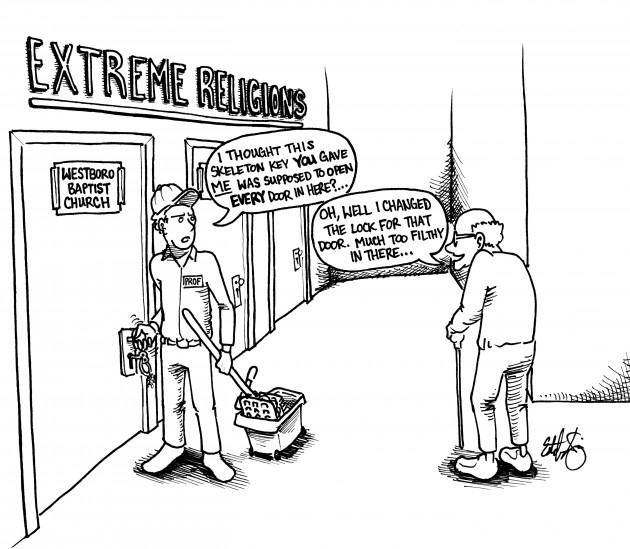
Miami University’s Department of Comparative Religion caused a stir in Ohio last week with their proposal to invite a member of the Westboro Baptist Church to speak. It was, however, the College of Arts and Science that made national headlines when a decision was reached to drop the plans altogether.
Shirley Phelps-Roper was scheduled to visit Dr. Hillel Gray’s 100-level class on religious extremism. Phelps-Roper is a lawyer and the daughter of Fred Phelps, minister of Westboro Baptist Church. Many people, including one contributing writer for the Baptist Press, have argued Westboro is closer to a hate group than a church.
The Miami Student, the university’s newspaper, reported the Department of Comparative Religion sent a proposal to the College of Arts and Science to “give notice and invite input concerning the plans” for Phelps-Roper’s visit.
The College of Arts and Science did not feel Phelps-Roper’s appearance was a good idea, and the college’s dean, Phyllis Callahan, said she was concerned with the risk of bringing a controversial speaker to campus.
While the College of Arts and Science did not have the power to restrict speakers from visiting classes, the department of Comparative Religion cancelled Phelps-Roper’s appearance in Gray’s class knowing the College of Arts and Science reacted negatively to the proposal.
The College of Arts and Science’s disapproval of the speaker is a direct violation of Gray’s academic freedom, which, according to its definition, outlines the professor’s right to teach as he or she sees fit.
If the College of Arts and Science is denying Gray’s proposal by arguing his invitation to Phelps-Roper is evil, perhaps the college has more in common with the church than it thought. To deny exposure to views that challenge one’s own thinking, is in a way what Westboro Baptist Church advocates for daily. The group is well known for its numerous protests outside military funerals in which members carry signs with offensive slogans such as “God Hates Fags” and “Thank God for Dead Soldiers.” The group believes military deaths are God’s punishment for the tolerance of homosexuality and a sign of the coming destruction of America.
Though Miami University does not necessarily agree with the views of Westboro Baptist Church, the group provides an appropriate and almost crucial guest for a class on extreme religion.
Academic freedom aside, Miami University employs Gray to teach religious extremism to students. Therefore the College of Arts and Science should also trust Gray’s judgment in who he invites to speak to those same students.
Callahan told the Student, “We do not restrict faculty members’ ability to invite a guest speaker to their class.” Adding, however, “If I have an approval voice, I will not approve it.”
It seems as though Callahan is not sure what her stance is. To say the College of Arts and Science does not limit a professor’s academic rights, but if given the chance to do so, she would, is contradictory at best.
Again, the College of Arts and Sciences at Miami University does not have the power to ban speakers brought to the department of religion. But more importantly, the visit shouldn’t have needed approval in the first place. It should have been common sense to have a religion extremist group speak in a class about religious extremism.
Whether or not the beliefs of Westboro Baptist Church are in line with those of the department and the university, canceling the speaker was unnecessary.
If Miami University considers a class on extreme religion to be appropriate, real-world extremist groups should be on the curriculum list. What better way is there to broach the subject than a visit from a member of Westboro Baptist Church?


